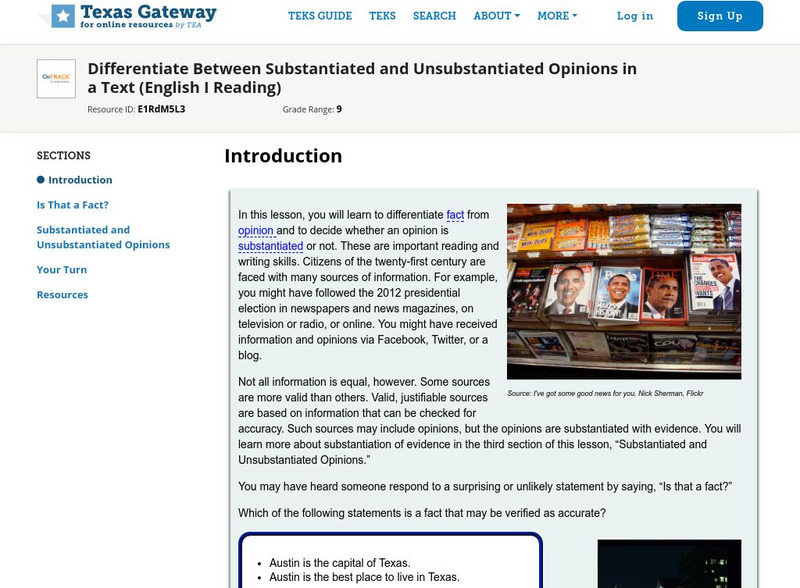Hi, what do you want to do?
Curated OER
Happy Homes Estate Agents
In this Language Arts worksheet, students read a page from Happy Homes Estate Agents. Students read descriptions of holiday cottages in the UK.
Curated OER
Independent - To Be or Not Top Be - Day 2, Lesson D: Intestinal Fortitude
Fifth graders explore intestinal fortitude in terms of their oral presentation.
Curated OER
Independent - To Be or Not Top Be - Day 2, Lesson C: Freedom of Speech
Fifth graders explore the following questions: What is it? What is it like? What is an example?
Curated OER
Scavenger Hunt
Students search for items in various parts of the newspaper noting the different types of information it provides.
Curated OER
Making Formal Requests
High schoolers investigate the concept of making formal requests and examples are included in the lesson plan for teacher presentation. They practice using the phrases in a variety of situations and then make presentations for others to...
Curated OER
Creative Writing
Eleventh graders write a persuasive letter to the editor using the writing process.
Alabama Learning Exchange
Alex: Fact vs. Opinion
This lesson is a hands-on way for students to learn how to discern between fact and opinion. This is an important skill for citizenship in that citizens should be informed about what is happening in their communities and should take...
Texas Education Agency
Texas Gateway: Differentiate Substantiated and Unsubstantiated Opinions in Text
[Accessible by TX Educators. Free Registration/Login Required] In this lesson, students will learn to differentiate fact from opinion and to decide whether an opinion is substantiated or not.
Other
Grade 1 Informative Writing Lessons
Authored by the Tsehai Russell and Della Wright, CLR fellows, this resource provides a 5-day unit of informative writing lessons. Focus lessons related to facts and opinions and paragraph writing. This series is supported by the Academic...
Sophia Learning
Sophia: Facts
This slideshow lesson focuses on facts; they are true, verifiable, and identical across sources. General facts, commonly accepted, do not need citations; specific facts: statistics, expert testimony, and anecdote do require citation.
English Zone
English Zone: Simple Present Tense: Fact, Habit, Opinion, or Schedule
This 10question, self-scoring quiz for fact or opinion, but it takes it further to include habit and schedule. Students read the statement and the possible choices and select the correct one. The options are explained with examples at...
Texas Education Agency
Texas Gateway: Differentiate Between Substantiated and Unsubstantiated Opinions
[Accessible by TX Educators. Free Registration/Login Required] In this lesson, you will learn to differentiate fact from opinion and to decide whether an opinion is substantiated or not. These are important reading and writing skills.
Texas Education Agency
Texas Gateway: Analyze Literary Essays' Inclusion of Personal Opinions and Facts
In this lesson, you will learn how to identify and discuss the use of facts, personal examples, and ideas and how they are woven into a literary essay.
Sophia Learning
Sophia: Supporting Details Explained
This slideshow focuses on supporting details; it discusses their purpose, the audience, and the point to be made. It lists the five most common types of supporting details: facts, statistics, opinions, examples, and personal observations...
ArtsNow
Arts Now Learning: My Sound Is the Best! [Pdf]
In this lesson, students will use music as an impetus for stating and supporting opinions. They will compose an opinion poster based on a narrative about a train using percussion instruments. This will involve group work which can lead...
US Census Bureau
United States Census Bureau: Numbers That Tell a Story
Using State Facts for Young scholars, a data access tool from the U.S. Census Bureau, students will explore data about their state and voice their opinions on how the population has changed over time. Young scholars will work in small...


















